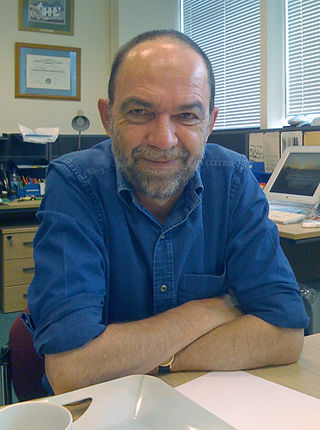Related Research Articles

Sir Alec John Jeffreys, is a British geneticist known for developing techniques for genetic fingerprinting and DNA profiling which are now used worldwide in forensic science to assist police detective work and to resolve paternity and immigration disputes.
Affymetrix is now Applied Biosystems, a brand of DNA microarray products sold by Thermo Fisher Scientific that originated with an American biotechnology research and development and manufacturing company of the same name. The Santa Clara, California-based Affymetrix, Inc. now a part of Thermo Fisher Scientific was co-founded by Alex Zaffaroni and Stephen Fodor. Stephen Fodor and his group, based on their earlier development of methods to fabricate DNA microarrays using semiconductor manufacturing techniques.
Genetic genealogy is the use of genealogical DNA tests, i.e., DNA profiling and DNA testing, in combination with traditional genealogical methods, to infer genetic relationships between individuals. This application of genetics came to be used by family historians in the 21st century, as DNA tests became affordable. The tests have been promoted by amateur groups, such as surname study groups or regional genealogical groups, as well as research projects such as the Genographic Project.
Kimberly Quinn is an American journalist, commentator and magazine publisher and writer; latterly the publisher of British conservative news magazine The Spectator.

PerkinElmer, Inc., previously styled Perkin-Elmer, is an American global corporation that was founded in 1937 and originally focused on precision optics. Over the years it went into and out of several different businesses via acquisitions and divestitures; these included defense products, semiconductors, computer systems, and others. By the 21st century, PerkinElmer was focused in the business areas of diagnostics, life science research, food, environmental and industrial testing. Its capabilities include detection, imaging, informatics, and service. It produced analytical instruments, genetic testing and diagnostic tools, medical imaging components, software, instruments, and consumables for multiple end markets. PerkinElmer was part of the S&P 500 Index and operated in 190 countries.
Ancestry.com LLC is an American genealogy company based in Lehi, Utah. The largest for-profit genealogy company in the world, it operates a network of genealogical, historical records, and related genetic genealogy websites. It is owned by The Blackstone Group, which acquired the company on December 4, 2020, in a deal valued at $4.7 billion.
The Al Jazeera bombing memo is an unpublished memorandum made within the British government which is said to be the minutes of a discussion between United States President George W. Bush and Prime Minister Tony Blair. The Daily Mirror published a story on its front page on 22 November 2005 that said the memo quotes Bush speculating about a US bombing raid on Al Jazeera's world headquarters in the Qatari capital Doha and other locations. The story said that Blair persuaded Bush to take no action.

David Blunkett, Baron Blunkett, is a British Labour Party politician who has been a Member of the House of Lords since 2015, and previously served as the Member of Parliament (MP) for Sheffield Brightside and Hillsborough from 1987 to 2015, when he stood down. Blind since birth, and coming from a poor family in one of Sheffield's most deprived districts, he rose to become Education and Employment Secretary, Home Secretary and Work and Pensions Secretary in Tony Blair's Cabinet following Labour's victory in the 1997 general election.
Illumina, Inc. is an American biotechnology company, headquartered in San Diego, California. Incorporated on April 1, 1998, Illumina develops, manufactures, and markets integrated systems for the analysis of genetic variation and biological function. The company provides a line of products and services that serves the sequencing, genotyping and gene expression, and proteomics markets, and serves more than 155 countries.

Thermo Fisher Scientific Inc. is an American-headquartered life science and clinical research company. It is a global supplier of analytical instruments, clinical development solutions, specialty diagnostics, laboratory, pharmaceutical and biotechnology services. Based in Waltham, Massachusetts, Thermo Fisher was formed through the merger of Thermo Electron and Fisher Scientific in 2006. Thermo Fisher Scientific has acquired other reagent, consumable, instrumentation, and service providers, including Life Technologies Corporation (2013), Alfa Aesar (2015), Affymetrix (2016), FEI Company (2016), BD Advanced Bioprocessing (2018), and PPD (2021).

FamilyTreeDNA is a division of Gene by Gene, a commercial genetic testing company based in Houston, Texas. FamilyTreeDNA offers analysis of autosomal DNA, Y-DNA, and mitochondrial DNA to individuals for genealogical purpose. With a database of more than two million records, it is the most popular company worldwide for Y-DNA and mitochondrial DNA, and the fourth most popular for autosomal DNA. In Europe, it is the most common also for autosomal DNA. FamilyTreeDNA as a division of Gene by Gene were acquired by MYDNA, Inc., an Australian company, in January 2021.
Laboratory Corporation of America Holdings, more commonly known as Labcorp, is an American healthcare company headquartered in Burlington, North Carolina. It operates one of the largest clinical laboratory networks in the world, with a United States network of 36 primary laboratories. Before a merger with National Health Laboratory in 1995, the company operated under the name Roche BioMedical. Labcorp performs its largest volume of specialty testing at its Center for Esoteric Testing in Burlington, North Carolina, where the company is headquartered. As of 2018, Labcorp processes 2.5 million lab tests weekly.

Pacific Biosciences of California, Inc. is an American biotechnology company founded in 2004 that develops and manufactures systems for gene sequencing and some novel real time biological observation. PacBio has two principal sequencing platforms: single-molecule real-time sequencing (SMRT), based on the properties of zero-mode waveguides and sequencing by binding (SBB) chemistry, which uses native nucleotides and scarless incorporation for DNA binding and extension.
Events from 2003 in England

International Biosciences (IBDNA), is a UK-based DNA testing company with offices in Brighton, East Sussex. The company offers a range of DNA tests including the Natera Panorama prenatal test as well as peace of mind relationship tests, ancestry and genetic predisposition testing., International Biosciences operates worldwide and has operations in Ireland, France, Germany, Spain, Italy, Canada and India.
Tom Brown FRSC FRSE is a British chemist, biotechnologist, and entrepreneur. He is the Professor of Nucleic acid chemistry at the Department of Chemistry and Department of Oncology at the University of Oxford. Currently, he is serving as the President of the Chemical Biology Interface Division of the Royal Society of Chemistry. He is best known for his contribution in the field of DNA Repair, DNA Click chemistry, and in the application of Molecular genetics in forensics and diagnostics.
Suman Kumar Dhar is an Indian molecular biologist and a professor at the Special Centre for Molecular Medicine of Jawaharlal Nehru University. He is known for his studies on the DNA replication and cell cycle regulation in Helicobacter pylori and Plasmodium falciparum, two pathogens affecting humans. An elected fellow of the National Academy of Sciences, India, Indian National Science Academy and the Indian Academy of Sciences, he is also a recipient of the National Bioscience Award for Career Development of the Department of Biotechnology in 2010. The Council of Scientific and Industrial Research, the apex agency of the Government of India for scientific research, awarded him the Shanti Swarup Bhatnagar Prize for Science and Technology, one of the highest Indian science awards, in 2012, for his contributions to biological sciences.
Sudhanshu Vrati is an Indian immunologist, microbiologist and the director of the Regional Centre for Biotechnology. Known for his studies in the fields of RNA virus replication and vaccine development, Vrati is an elected fellow of the National Academy of Sciences, India, Indian National Science Academy and the Indian Academy of Sciences. The Department of Biotechnology of the Government of India awarded him the National Bioscience Award for Career Development, one of the highest Indian science awards, for his contributions to biosciences in 2003.

William H.Rastetter, a scientist, entrepreneur and venture capitalist, is the chair of Neurocrine Biosciences, of Fate Therapeutics, and of Daré Bioscience, Inc. in San Diego, California. He was a founding board member and investor in GRAIL, Inc. in Menlo Park, California, and served for a period as the company's interim CEO (2017) and chair (2017-2018). Rastetter is also a director of Regulus Therapeutics and Iambic Therapeutics. He was a partner in the venture firm Venrock (2006-2013), and a trustee at Caltech (2015-2018). He has served as a director (1998-2016) and as chair of Illumina (2005-2016). He advised SVB Leerink (2014-2019) and currently advises Illumina Ventures.
Sir Ronald Claus Hampel is an English former businessman, who was chief executive and chairman of ICI in the 1990s. He planned and oversaw the Zeneca de-merger in June 1993.
References
- ↑ "DNA Bioscience Brings Breakthrough in Home DNA Testing". PR Newswire. 8 August 2003. Retrieved 12 December 2016.
- 1 2 Antony Barnett and Tania Branigan "DNA company that Blunkett backed heads for collapse", The Guardian , 9 December 2005
- ↑ Rosie Murray-West "Blunkett could lose £15,000 as DNA company faces insolvency", The Daily Telegraph , 10 December 2005
- ↑ "Debts force Blunkett DNA test company to halt trading", The Times , 12 December 2005 (subscription needed)